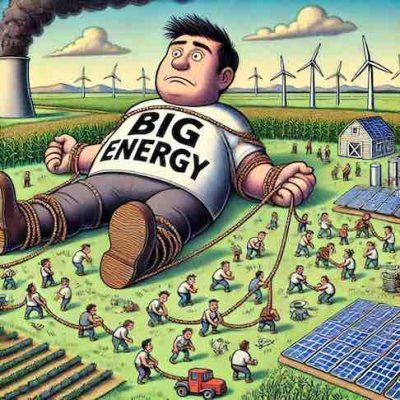
It is also focused on the wrong future.
Black is a highly respected, former BBC environmental science journalist – he left the Corporation over a decade ago because his face didn’t fit in the febrile world of accusation and counter- accusation from climate deniers, and determined greenwashing from the large corporations which had begun muscling in on the funding for environmental tech.
Black’s general approach is in line with the UK government thinking. Their planned Great British energy invesmtnet vehcile will soon be dispensing its modest budget (£8.5 billion) to assist clean energy startups of all sorts – but mainly big ones. Black thinks Coal Oil and Gas are Bad. Clean Energy is Good. Which is perfectly true as far as it goes. But despite his talk about the Rockefeller oil dynasty and the distrust of government that comes through in every chapter – Black still opts for the easy life – adopting the general consensus in the climate industry that the present system will be much like the past but cleaner and better – that we can keep living largely the same way and dong much the same things, but somehow clean energy delivered by large companies will solve our climate problems for us.
This is not the conclusion I wanted to hear, and its all the more strange because a short chunk of the book does pay lip service to off-grid energy. Pages 43-46 of the 200 page book has Black telling us:
“For me, one of the biggest attractions of the clean energy system is the power it confers on people and businesses to make their own decisions. By opting in, people can choose to rid themselves of the daily dependence on coal for the fire, petrol for the car and gas for the boiler…”
He goes on
“With P2P trading, electricity is used close to where it is generated, reducing the need for big transmission cables, substations and other grid paraphernalia.“
The centralised grid, which like most commentators Black wants to see cleaned up “decarbonised strengthened and extended – is more part of the problem than it is part of the solution.
Black’s argument is very much in the mainstream of current thought – he is going with the flow But he would do well to remember that when he argues against Oil, Gas and Coal – he is doing the nuclear industry’s job for them – jsut imageine all those energy industry bosses salivating tat the thought of the extra bonuses they will get when oil is finally stopped. True, Black criticises Just Stop Oil for their performance politics – but he makes the same mistake as JSO – not realising that the culprit is not Big Oil = it is Big Energy that got us into this mess.. Surely it is madness to expect them to now get us out of it? He argues against nuclear – does not consider the possibility of micro, off-grid nuclear.
Compared to other recent overviews of climate intervention like Pandora’s Toolbox , written by Yale’s Wake Smith, Black is paddling in the shallows.
Despite its impeccable sourcing, and bang-up-to-date references, this book’s main thesis could have been written five years ago, or more. Black does not consider the detailed benefits of microgrids – the word microgrid gets just one mention in the book, and one in the footnotes.
But microgrids are just as likely to be part of the future energy mix as nuclear. In other words they are almost certain to be part of the future – apparently not the part Black wants to discuss.
Nevertheless, “The Future of Energy” is recommended as a primer on what mainstream environmentalists are thinking and saying – and that now includes nuclear executives, government energy ministers, and consumer goods manufacturers.
ENDS
